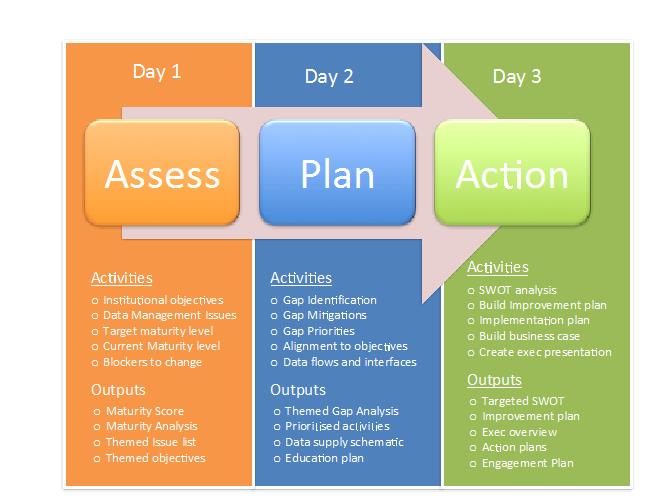Queen's University Belfast case study
The Challenge
Like many institutions data at QUB is held in many different places, in many different formats to support many different types of use. Data is held on students, courses, staff, estates, finance etc and all of these have many interactions with each other.
QUB is in the midst of a major transformation as part of their ‘Vision 2020’ strategy, much of which will be underpinned by effective, flexible and efficiently run data services.
QUB realise their data is an institutional wide asset and must be treated as such. How then to reconcile all of these ‘data silos’ to a single version of the truth?
What did we do?
The HEDIIP Data Capability project ran a couple of pilots to demonstrate the effectiveness of a process and toolkit to both assess and create a plan to improve Data Capability within the HE sector. This took the form of a three day workshop:

At Queens a multi-disciplinary team was assembled stretching across professional teams. This team worked hard for three days assessing their current maturity state and – more importantly – locking in an improvement plan which showed direct support for the stated aspirations of the organisation.
As well as using a detailed set of data capability questions to peg the current maturity level, an ‘aspirational level’ was selected based on the benefits both now and in the future for QUB.
Between these two maturity levels were the gaps to be closed based on the data improvement plan. To do so short and medium term actionable work packages were created, themed by concepts such as ‘Education’, ‘Architecture’ and ‘Process’.
At the close of the workshop Queens had detailed collateral to support that plan and a senior management summary of the options around how to implement the plan.
What were the results?
QUB had already established a group to improve the quality of their data. It was recognised early on that this group would be the ideal conduit to lead on these new plans.
Of the four ‘themes’ identified QUB chose to focus on modelling and process. This theme will be the foundation of creating a single understanding of how data flows through the institution, which will enable them to migrate from a silo approach to data to a single view that will support all owners, stewards and users of data.
These themes will continue to be actioned directed by the priorities of the institution. QUB now has the framework, toolkit and understanding to improve Data Capability in support of the organisations aspirations.
Summary
QUB participated in the workshop in a truly engaged manner. By running with a cross-functional team and a clear set of priorities they built a data improvement plan focused on the wider benefits of the institution, and a number of conduits to begin to get these changes made.
The Data Capability project was enriched by rigorously testing out the process and nuancing the collateral to ensure maximum effect during self assessment.
The workshop and toolkit really helped Queens look at data from an enterprise perspective rather than just within individual systems. It helped us paint a picture of all our systems where the data is flowing – both internally and externally – and helped us to see why these sometimes cause us problems! The output of the toolkit is a data improvement plan, linked to our Corporate Strategy, which includes some short-term fixes along with longer term initiatives.
On the back of this we recently gained senior support for the establishment of a new Working Group to take the initiative forward. This will not be an easy task, but we believe if we take these initiatives forward we will be much better placed to deal with the changes the New Landscape will bring.
- Olivia Roberts MBA (Tech Mgmt)
Head of Student Services & Systems
